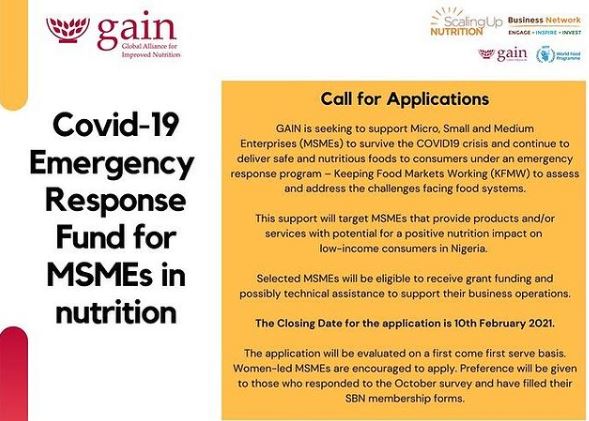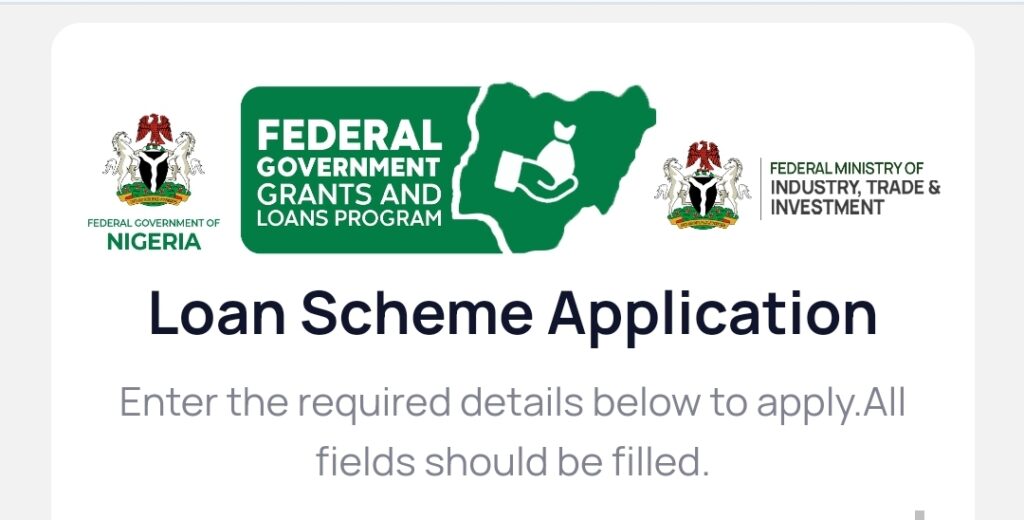In response to the ongoing COVID-19 crisis ,Global Alliance for Improved Nutrition (GAIN)has established an emergency response programme, Keeping Food Markets Working (KFMW) to assess and address the challenges facing food systems. This programme has the overarching goal of mitigating the risk of economic collapse of food systems in order to sustain the availability and affordability of nutritious and safe foods, and contribute to lowering the burden of ill-health, particularly for the most vulnerable. GAIN appreciates that to weather the current crisis and to guard against future shocks, the resilience of MSMEs must be increased.
One of the KFMW’s program priority areas involves developing and delivering interventions that provide emergency grants for MSMEs providing safe, nutritious foods that will enable them to weather theCOVID-19 crisis financially and will further build and sustain resilience. This support will target MSMEs in nutritious food value chains with potential for a positive nutrition impact on low-income consumers in Nigeria.
Grants are small emergency grants (between₦2,000,000–₦4,000,000) to address immediate losses or costs, such as salaries, where this helps the business to build resilience against COVID-19. The grant is designed with consideration to the diverse needs of both male and female entrepreneurs (who may face increased burdens of care work amid COVID-19 related school closures)
Eligibility and Evaluation Criteria
Applicants must meet all the following criteria in order to be considered for support from KFMW and should be able to provide evidence:
1.Company is for-profit
2.Company has been in operation for the last3 years (Since2017)
3.Company is a legally registered and tax paying entity in Nigeria (able to provide CAC Certificate, TIN number/Tax Clearance etc.)
4.Company must currently be operating in Nigeria
5.Company is a financially viable business
6.Company must be gender sensitive in its operations–this can mean having a gender equity policy or a good proportion of women in leadership, or the numbers of female staff employed in the company, or be women-owned businesses ,or be focussed on the production of products that cater to all genders as opposed to focused on a particular gender, or provide targeted training and capacity development for women, etc
7.Company’sbusiness is focused on nutritious food value chains and can be in any part of the supply chain, that is, either in production, processing, packaging, storage, distribution, or sales etc. of nutritious foods. Priority will be given to companies that directly relate to the following priority food types: poultry (meat and eggs), beans and other pulses, fruits and vegetables, fish, dairy and(bio)fortified foods. Grants will also consider other nutritious foods with potential to make significant contribution to nutrition of low-income consumers.
8.All proposals will be evaluated against the following criteria:
- Business Capabilities–The entrepreneur and the company should have demonstrable business capabilities to oversee the implementation of its business
- Feasibility of Supply–The business should be able to procure the inputs/raw materials, produce and/or provide services in Nigeria. Inputs should be reliably available in the country; the production process and distribution model should be suitable for the local environment and very appealing to the target market
- Feasibility of Demand–The business should have already existing or strong potential demand for their product and/or service
- Nutrition Impact: Scale–The product/service should be widely available and accessible to consumers especially to low income consumers and contribute to their nutrition
- Nutrition Impact: Significance–The product/service should be safe, and contribute significantly to population nutritional requirements especially the low-income consumers
- Feasibility of time frame–The grant will be implemented within the KFMW project timeline (as soon as possible and not later than May 2021) and nutritious foods will be made available to those at the Bottom of the Pyramid (BoP) /Low income consumers. Preference will be given to applications that have quick implementation timelines.
- Likelihood of the Proposal to lead to cost-effective recovery–the proposal rationale should be founded on COVID-19 crisis recovery but also clearly explain how the proposed solution has the potential or is likely to lead to cost effective recovery
Grant Utilisation
- Grants can be used to address immediate losses or costs, such as salaries, working capital or overhead costs; and purchase of raw materials for nutritious food etc
- Applications will be required to emphasize the nutritional impact of the product for Nigerian consumers
- Applications with a primary focus on infrastructure or on products that are not for local consumption; for example, grant utilisation for the construction of roads, or for products for export, will not be considered
- Grants must be implemented in Nigeria
- Grant should be utilised for inputs, raw materials for nutritious foods, equipment etc. which are locally sourced (except components that are not available locally)
- Grants should not be used for anything that can be deemed to have adverse effects–promote Non-communicable diseases (NCDs), negatively affects the environment, does not consider food safety (including the use of chemicals that can be hazardous to human health), high levels of salt, sugar, trans fat etc.
- Grants should be used forCovid19crisis recovery
Application closes on February 10,2021
Access grant application package HERE











I will be very happy, if i can be selected from the people that will collect the grant. Thanks to MSMEAFRICA